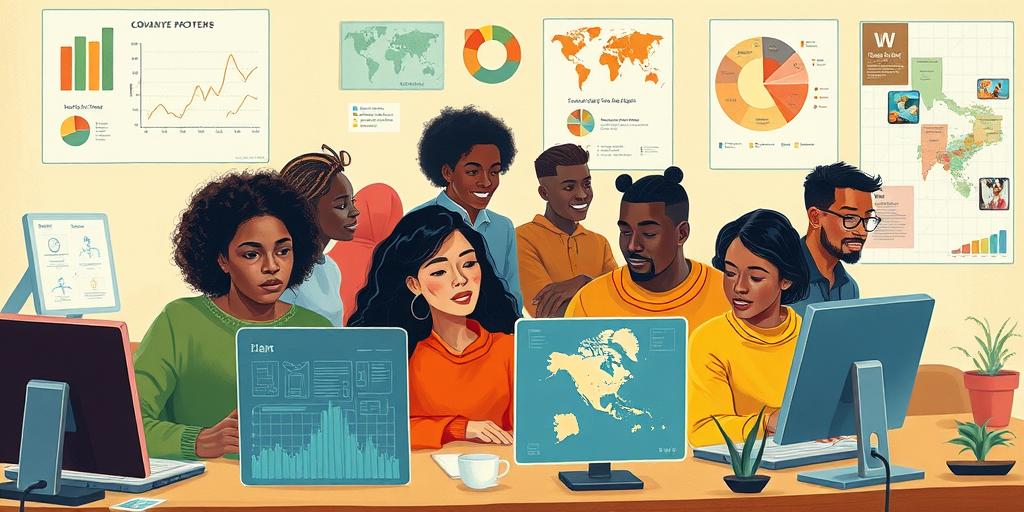Discover how data science is revolutionizing underserved communities worldwide! From improving healthcare access to boosting economic opportunities, the impact is undeniable. We’ll explore inspiring success stories and reveal the transformative potential of data-driven solutions for a more equitable future. Prepare to be amazed by the power of data to bridge the gap and empower those who need it most.
Bridging the Divide: Data Science for Underserved Communities
Data science, with its ability to uncover hidden patterns and insights from complex datasets, presents an unprecedented opportunity to address long-standing challenges faced by underserved communities. These communities, often marginalized and lacking access to essential resources, are disproportionately affected by various social and economic issues. However, the application of data science provides a powerful tool to analyze these disparities and develop targeted interventions. By leveraging data-driven approaches, organizations and researchers can gain a deeper understanding of the unique needs of these communities and create more effective, equitable programs.
Healthcare Access and Outcomes
One particularly impactful application of data science in underserved communities is improving access to quality healthcare. Data analysis can help identify underserved areas lacking adequate healthcare facilities, predict potential health crises, and optimize resource allocation to meet community-specific demands. By analyzing data on health patterns, disease prevalence, and socioeconomic factors, researchers can develop more targeted and effective health interventions. For example, predicting outbreaks of infectious diseases allows for preemptive measures to prevent widespread illness and death. Predictive modeling of hospital readmission rates assists healthcare providers in tailoring treatment plans to reduce costs and improve patient outcomes.
Economic Empowerment and Opportunity
Beyond healthcare, data science plays a crucial role in fostering economic empowerment in underserved communities. By analyzing data on employment trends, education levels, and access to financial services, organizations can identify specific barriers to economic mobility and tailor programs to address them. Microfinance institutions, for example, leverage data analytics to assess creditworthiness and risks for underserved entrepreneurs, enabling them to access crucial financial resources and build successful businesses. Furthermore, data-driven job training programs can be designed to match individuals with high-demand employment opportunities. This tailored approach maximizes the likelihood of long-term job placement and economic success.
Data-Driven Solutions for Social Impact
The power of data science extends to addressing various other social issues within underserved communities. For instance, data analytics can be used to optimize the delivery of essential services, such as clean water and sanitation, to ensure equitable distribution across all communities. Similarly, data can be leveraged to improve urban planning and infrastructure development in under-resourced areas, promoting sustainable growth and economic opportunity. The combination of geographic information systems (GIS) and data analytics provides an effective method for identifying optimal locations for infrastructure upgrades and resource allocation. This precise, data-driven approach significantly reduces waste and increases positive outcomes.
Challenges and Ethical Considerations
While the potential benefits are immense, it’s crucial to acknowledge the ethical considerations and challenges associated with the use of data science in underserved communities. Issues such as data privacy, algorithmic bias, and the digital divide must be carefully addressed. Efforts should be made to ensure that data is collected and used responsibly, avoiding perpetuating existing inequalities. The focus should always be on creating solutions that are inclusive, transparent, and empowering, respecting the autonomy and dignity of community members.
The Future of Data Science for Social Good
The future of data science for underserved communities is incredibly bright, promising a wave of innovative solutions. As data collection and analytical techniques advance, we can expect to see even more targeted and effective interventions. The ongoing development of sophisticated AI and machine learning algorithms can lead to early detection of crises, improving response times and mitigating their severity. The increasing accessibility of data science tools and training will empower local communities to play a more active role in identifying and solving their problems. Collaboration between data scientists, community leaders, and policymakers will be essential to ensure that data-driven solutions are tailored to local needs and contexts.
By harnessing the power of data, we can create a more just and equitable world for all, regardless of circumstance. Let’s work together to leverage data science’s immense potential for positive change.
Ready to make a difference? Learn more about how you can contribute to this transformative work!




